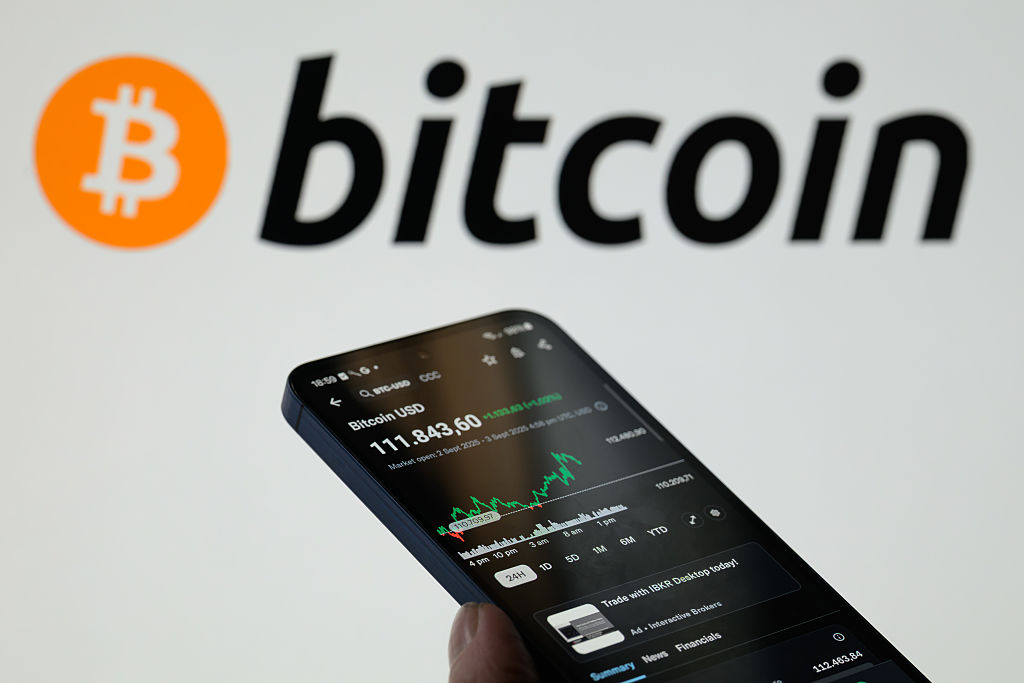Bitcoin 'has become the reserve asset of the internet'
The cryptocurrency has established itself as the electronic version of gold, says ByteTree’s Charlie Morris


Get the latest financial news, insights and expert analysis from our award-winning MoneyWeek team, to help you understand what really matters when it comes to your finances.
You are now subscribed
Your newsletter sign-up was successful
Want to add more newsletters?
On 8 October, UK retail investors will once again be able to invest in Bitcoin exchange-traded notes (ETNs), which will be listed on the London Stock Exchange.
The UK financial regulator, the Financial Conduct Authority, banned them in 2020, saying that crypto assets cannot be reliably valued by retail consumers because “these assets have no reliable basis for valuation”.
It was also concerned about “the prevalence of financial crime, extreme volatility, inadequate understanding by retail consumers, and the lack of legitimate investment need.
Try 6 free issues of MoneyWeek today
Get unparalleled financial insight, analysis and expert opinion you can profit from.

Sign up to Money Morning
Don't miss the latest investment and personal finances news, market analysis, plus money-saving tips with our free twice-daily newsletter
Don't miss the latest investment and personal finances news, market analysis, plus money-saving tips with our free twice-daily newsletter
These features mean retail consumers might suffer harm from sudden and unexpected losses if they invest in these products”.
This accurately described many crypto assets at the time, but I believe it was heavy-handed to include Bitcoin, along with the other major projects such as Ethereum.
Other countries have recognised this, and it is right that Britain should do the same.
In 2020, Bitcoin was emerging as an institutional asset, as it already had an active futures contract in the US.
Bitcoin exchange-traded funds, or ETFs, were launching in Switzerland, Germany, Brazil, Hong Kong, and Canada, and a US version was being discussed. (In Europe the ETFs are often called ETNs or ETPs, exchange-traded products.) The US ETFs were approved in January 2024.
They were a huge success, and the iShares Bitcoin Trust has grown into an $88 billion product, marking the most successful fund launch in BlackRock’s history. Two months later, the UK regulator revised its 2020 statement, saying that crypto ETNs could list in a new segment on the London Stock Exchange dedicated to professional investors only. It reiterated that crypto assets were “high risk and largely unregulated. Those who invest should be prepared to lose all their money”.
Then, as Bitcoin has enjoyed three years of relative calm, in June this year the Financial Conduct Authority (FCA) announced it would lift the ban on crypto ETNs for UK retail investors. “This consultation demonstrates our commitment to supporting the growth and competitiveness of the UK’s crypto industry. We want to rebalance our approach to risk and lifting the ban would allow people to make the choice on whether such a high-risk investment is right for them, given they could lose all their money.”
Catching up with the world on Bitcoin
The FCA recognised that Bitcoin was thriving and that the UK had become an overly cautious outlier. London is a major financial centre, and banning innovative financial products, risky or otherwise, would ensure London’s long-term irrelevance.
A little regulation is a good thing, but too much will certainly kill you. Some of its concerns were legitimate, because many crypto assets are intrinsically worthless. But Bitcoin, along with some other important crypto projects, stand out from the crowd.
For example, crypto assets are volatile, but even in 2020, Bitcoin was much less so than the rest. Its 360-day volatility was in line with Marks & Spencer or Legal & General at the time, and today it is even lower.
Bitcoin has also inspired many innovations, such as the stablecoin, enabling cash transactions in real time over the internet, and non-fungible tokens, which pave the way for the tokenisation of real-world assets. There have also been bright ideas in decentralised finance (DEFI), new trading technologies, and perpetual futures contracts. Many of these ideas are finding their way into mainstream markets. I think the next generation will not differentiate between equities and crypto as they will essentially merge.
Yet still to this day, many ask what Bitcoin's purpose is, and what value does it represent? I think the answer is simple, and the clue lies in its high correlation with the technology sector. While many describe it as electronic gold, its price doesn’t behave like it. It correlates with technology stocks because it is a technology. It has become the de facto reserve asset of the internet.
When you consider how fast AI is growing, and that it operates 24/7, can traditional banking keep up? Bitcoin trades instantly and settles within minutes. It is a very liquid asset trading around $40 billion each day, which is not as much as gold’s $150 billion, but is more than the most liquid stocks in the world, and growing.
The history of crypto regulation in this country mirrors the development of the asset.
As Bitcoin has matured, the regulator has shifted its stance.
At the time of the ban on 6 October 2020, the price of Bitcoin was £8,189. Today it is £84,497. There must have been concerns that Bitcoin was extremely risky, because I cannot recall a case where investors have been prevented from buying a publicly traded asset before.
In UK regulatory circles, we should presume that Bitcoin was seen to be highly toxic. As the FCA is at pains to point out, Bitcoin might still lose you all of your money, but it is also recognised that it could do the opposite.
For those who are intrigued but wary, I have the solution. By holding the 21Shares Bitcoin and Gold ETP (Zurich: BOLD), you get the best of both worlds. It tracks the BOLD index, which I created five years ago. By regularly rebalancing, it adds value by taking profits from the stronger asset, and adding to the weaker, which also keeps a lid on risk. And by owning gold alongside Bitcoin, losing all of your money becomes impossible.
Charlie Morris is the CEO and founder of ByteTree. It offers investment research for private clients through the Multi-Asset Investor (bytetree.com/the-multiasset-investor), in addition to other research services.
This article was first published in MoneyWeek's magazine. Enjoy exclusive early access to news, opinion and analysis from our team of financial experts with a MoneyWeek subscription.
Get the latest financial news, insights and expert analysis from our award-winning MoneyWeek team, to help you understand what really matters when it comes to your finances.
-
 Inheritance fights are up 80% – here’s why and what to do if it happens to you
Inheritance fights are up 80% – here’s why and what to do if it happens to youFamilies are increasingly disputing inheritances, as age-related and economic factors force a tussle over the last will and testament of loved ones. What should you do if you find yourself in the middle of a fight over money?
-
 The northern powerhouse city where first-time buyers are snapping up properties
The northern powerhouse city where first-time buyers are snapping up propertiesFirst-time buyers are “casting their nets” wider to find properties that match their budgets and lifestyles. We look at the top areas for first-time buyers.
-
 How to invest as the shine wears off consumer brands
How to invest as the shine wears off consumer brandsConsumer brands no longer impress with their labels. Customers just want what works at a bargain price. That’s a problem for the industry giants, says Jamie Ward
-
 A niche way to diversify your exposure to the AI boom
A niche way to diversify your exposure to the AI boomThe AI boom is still dominating markets, but specialist strategies can help diversify your risks
-
 New PM Sanae Takaichi has a mandate and a plan to boost Japan's economy
New PM Sanae Takaichi has a mandate and a plan to boost Japan's economyOpinion Markets applauded new prime minister Sanae Takaichi’s victory – and Japan's economy and stockmarket have further to climb, says Merryn Somerset Webb
-
 Early signs of the AI apocalypse?
Early signs of the AI apocalypse?Uncertainty is rife as investors question what the impact of AI will be.
-
 8 of the best properties for sale with beautiful kitchens
8 of the best properties for sale with beautiful kitchensThe best properties for sale with beautiful kitchens – from a Modernist house moments from the River Thames in Chiswick, to a 19th-century Italian house in Florence
-
 Three key winners from the AI boom and beyond
Three key winners from the AI boom and beyondJames Harries of the Trojan Global Income Fund picks three promising stocks that transcend the hype of the AI boom
-
 RTX Corporation is a strong player in a growth market
RTX Corporation is a strong player in a growth marketRTX Corporation’s order backlog means investors can look forward to years of rising profits
-
 Profit from MSCI – the backbone of finance
Profit from MSCI – the backbone of financeAs an index provider, MSCI is a key part of the global financial system. Its shares look cheap
